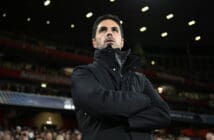A bit like the extraction of his golden locks, Jannik Vestergaard’s progress at Southampton has been slow to say the least.
The jury is still out on the defender entering his third season on the south coast. Perhaps in exact alignment of his own team’s fortunes, it’s been rough sailing.
The life of a footballer is fraught with peaks and troughs. The immediacy in which the modern world lives means fluctuating opinions and ways of thinking are often erratic, with tendencies to swing back and forth. Given the see-sawing of emotions, it’s a rarity for a footballer to feel truly accepted by a fanbase.
Win and you are the greatest living organism on the planet. Lose? Well, it’s often not worth thinking about; just take refuge and try to deflect the storm of ridicule that’s bound to come your way.
At first, Vestergaard arrived as the brand spanking new £18 million-pound addition, seen as the heir to Virgil Van Dijk and his defensive throne. He was set to simply follow the long, illustrious line of Southampton defenders that had previously wielded their considerable skillset upon the St Mary’s turf.
Jose Fonte, Toby Alderweireld, Van Dijk. Southampton felt they’d acquired their next rough diamond who would undergo an eventual gleaming. The quirky double entendre headline that would inevitably see the new acquisition depicted as Southampton’s ‘Great Dane’ was surely not too far away.
But three years on, Jannik Vestergaard has had to put up with more ravaging, negative headlines than any of his aforementioned peers. Castigated, regularly scapegoated and jarred with the incessant reminder you may not be good enough, it would be understandable if the Dane felt his time at Southampton feels a lot longer than just the three years.
Speaking recently, Vestergaard confessed as much: “I must not hide the fact that there have been periods when it seemed that I should not continue.”
But as always, a new start – in a footballer’s case a transfer or a new season – imparts renewed optimism. At the time of writing, Vestergaard made his third consecutive start and came up with the added time equaliser against Chelsea. Perhaps for the first time during his Southampton career, he was trending on social media for all the right reasons. And the quirky double-entendre headline that had been left on standby for so long, was finally put into print.
He may be a good actor or a high-end poker player, but if it wasn’t through his own admittance, there would have been no way of telling if the criticism had affected him. On the face of it, even throughout the severe lows, he rarely appeared ostensibly ruffled or scorned by the waves of such vitriol.
For a player who often acts as the first point of blame after a Southampton loss, it is somewhat remarkable that he appears so unperturbed by it all. Unlike other former Saints players who have used the press or social media as a method of retaliation, Vestergaard prefers to keep his head down, his thoughts to himself and continue his work on the training ground.
The central defender has been at Southampton for some time now and yet no one quite seems to know much about him. But what can be established is it takes a special character to bounce back from the critical barrages he’s been subjected to.
This writer talked to two of his former teammates to learn about the character of the man supporters know little of.
Born to a Danish father and a German mother, Vestergaard’s formative years were spent in the suburbs of Copenhagen, where he played for the city’s youth team. At 16 years of age, he made the short trip 16.3km eastwards to join Brøndby IF.
Already considerably taller than any of his new teammates, the teenager was having to deal with the complexities of his physical development. While he would tower over opposition teams, he was skinny and lacking power. Brent McGrath, a teammate at Brondby, can remember the first training session they shared together: “I first met Jannik when he was 16 and my first thought was ‘shit he’s big.’
“He was that size when we were younger, so he was a monster as you could imagine. But he wasn’t what I expected. What always struck me was his technique in both feet was something special. He had it all in his locker at that age. Size, height and dare I say finishing.

Vestergaard (bottom left) celebrating winning the under-17 Vinder international cup – photo: Brondby
“We played in Brøndby together for a few years as he was always playing up an age group. He had been playing as a striker but the coaches decided to turn him into a defender when we played together. I think that’s where his smart decision making and reading of the game comes from.”
McGrath has since returned to his homeland of Australia where he is playing for Bentleigh Greens, a club based in the outskirts of Melbourne. The 29-year-old made his professional debut for Brondby in 2010 and has played for four other clubs in Denmark as well as one in Thailand.
Despite McGrath’s well-travelled excursions, he says he still keeps in touch with Vestergaard from time to time, even if it’s just through the power of technology: “Still to this day, he is one of the nicest people you will ever come across. I used to drive him home from training in the afternoons as we lived close to each other and what struck me was how down to earth he was.
“With Jannik, although we don’t talk much as the years have gone by, he’s still someone I call a friend. He is always the first one to like my Instagram posts! I always look out for the Southampton results to see how he’s getting on, even if we don’t talk everyday.
“I don’t believe he has changed one bit. He’s still a very quietly spoken young lad with his feet planted on the ground and has done extremely well for himself. He was always pretty smart at school. I am proud to have had a chance to be teammates with him and call him a friend.”
Vestergaard receiving his medal – Photo: Brondby
For the 2010/11 season, an 18-year-old Vestergaard headed to his mother’s native land of Germany, where he would continue his development at Hoffenheim, playing for the club’s reserve side. And unsurprisingly, it was once again the vertical measurements of the new arrival which grabbed everyone’s attention.
This meant the young man, still in the adolescent stages of his career, would attract particular interest and curiosity. Vestergaard would often be the victim of perpetuated stares and awkward ogling from those watching on.
Eyeballs would be regularly drawn first to him and most would be keenly fixated on how a player of such height could be able to play with the ball at his feet. It was a fine nuance that none of his Hoffenheim teammates had to contend with.
For a young adult, the extra glare of a spotlight can either make or break them. Christian Lensch, a teammate of his at Hoffenheim II, believes the Dane’s laid back personality enabled a smooth transition into life in Germany. “Jannik came to Hoffenheim and it was funny because we’d played against each other in tournaments before and, of course, because of his size, he always stuck in our head.
Jannik Vestergaard is a rare breed of footballer. Eloquent, polite and possessing an unusually sounding English accent, the man from the suburbs of Copenhagen seems to take everything in his enormous stride.
Whisper it quietly. The soft spoken friendly giant may finally be growing in stature at Southampton.
![Prost International [PINT]](https://prostinternational.com/wp-content/uploads/2021/08/PINTtFontLogoRoboto1536x78.jpg)



